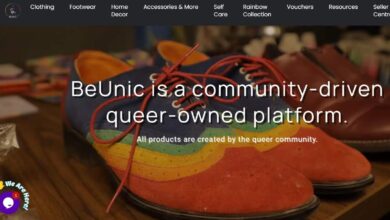Meet the man hoping to battle LGBTQ bank discrimination with a new credit union

A male-to-female transgender woman was locked out of her bank account in 2018 because a phone operator thought she sounded like a man.
A same sex couple was qualified for a mortgage, but a lending institution decided to deny them because gay marriage had just been legalized and the bank wasn’t sure how it was going to work out.
These are just a few of the stories that Myles Meyers cited as inspiration to start the country’s first LGBTQ credit union, which is slated to launch next year. Meyers’ effort comes in response to what advocates and researches say is systematic discrimination against LGBTQ clients.
“If I walk into a bank here in New York, I can pretty much handle anything they’re going to put in front of me,” Meyers told ABC News. “I go in with my husband and right away, we are having to adjust and watch for the adjustments that are happening in the institution.
“As a gay man, it is apparent that this occurs and we deal with this day in and day out.”
Same-sex couples are dramatically more likely to be denied a mortgage and then be hit with higher finance fees, according to a ground-breaking study that has sparked calls for the federal government to intervene.
The study, published in April by Iowa State University’s Ivy College of Business and based on more than two decades’ worth of U.S. mortgage data, found that gay and lesbian couples were 73 percent more likely to be denied a mortgage, despite having equal default risks to their straight counterparts. Overall, the approval rate, not controlled for credit risk, is 3-8 percent lower for the same-sex community.
When they were approved for a home loan, same-sex couples were more likely to be hit with higher interests rates, according to the study. The difference in finance fees was on average less than .5%, but when combined added up to as much as $86 million in extra costs annually.
“Lenders can justify higher fees, if there is greater risk. We found nothing to indicate that’s the case,” the researchers said in a statement. “In fact, our findings weakly suggest same-sex borrowers may perform better.”
“Policymakers need to guarantee same-sex couples have equal access to credit,” they added.
The Fair Housing and Equal Credit Opportunity acts prohibit discrimination based on a borrower’s race, gender, marital status or religion, but neither specifies sexual orientation. There are also only 14 states in the country with laws that prohibit credit decisions based on sexual orientation and gender identity, which puts about 72 percent of the LGBTQ population at risk for experiencing gender discrimination, according to data compiled by the Movement Advance Project.
Despite this, many entrepreneurs are stepping in to try to fill in the gaps with offerings aimed directly at LGBTQ consumers, who are estimated to have about some $1 trillion in buying power, according to market research firm Witeck Communications.
One of the small businesses trying to achieve this is Superbia Credit Union, a new company that plans to offer financial services that are unavailable at traditional lending corporations, such as loans for people undergoing transition and other products that are specific to the LGBTQ experience.
Regulators in Michigan approved the company earlier this month, clearing the way for it to start offering financial services online by early 2020 and making it the first financial institution geared to serving the national LGBTQ community.
Superbia Credit Union’s Meyers said the company will help combat the intolerance and discrimination that the LBGTQ community faces when accessing banking services.
“As many as 16 million people identify as LGBTQ in the country and they don’t get an experience of a financial institution that reflects and affirms who they are,” Meyers told ABC News. “We are continuously pushed through processes that are designed for the general population.”
As more LGBTQ entrepreneurs step up to offer alternatives to traditional banking, marketing experts say it’s imperative that established brands do more to show their commitment to helping marginalized communities.
“Right now, it’s a hodgepodge. Some states have laws to protect LGBT people, some don’t. But people would have to shop for equality by where they choose to live and work and in America, it should not operate that way,” market researcher Bob Witeck of Witeck Communications told ABC News. “People of color and women should not have to shop for states that are welcoming and not discriminating. Nobody should.”
Witeck, who specializes in market strategies surrounding lesbian, gay, bisexual, transgender and queer communities, said credit discrimination shows up in a variety of ways, but it’s “mostly psychological or attitudinal.”
“It’s not always because the bank may not have the right policies, but sometimes the staffers may not have been trained or educated to be more welcoming,” Witeck said. “The workers may make them feel like they don’t belong there. When they walk in, they treat they may make them wait longer to see if they get up and leave, or the employees may make off-hand comments to each other, or look at them with side eyes.”
“Overall, they make them feel like they’re not intended to be served,” he added.
Before Superbia Credit Union came around, there were already banking and credit institutions making efforts “to speak to the community,” Meyers noted, but he said those attempts seemed to be aligned to the calculation of the return on investment. For him, the goal is to attend to the financial needs of the community by listening to their concerns and adjusting.
“Surveys that are done on an annual basis show that LGBTQ people don’t feel connected to financial institutions. There isn’t enough communication happening around their needs,” Meyers said. “We don’t need to be treated as a niche market. That’s not necessary anymore.”
He said he expects to see more companies offer specialized services aimed at members of the LGBTQ community if traditional corporations fail to rise to the occasion.
“We know, in fact, that people in the past and thought of this, but we are the first that have been able to organize ourselves in a way that can serve the entire LGBTQ community through a financial institution that’s not for profit, and give back to the community,” Meyers said. “We’re looking at what’s occurring in and around the community, when it comes to policies and practices in a number of different industries and how that creates financial challenges, wealth gap, and discrimination.”




